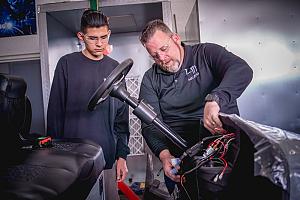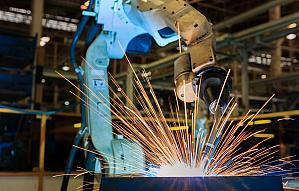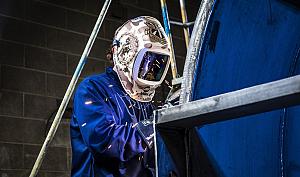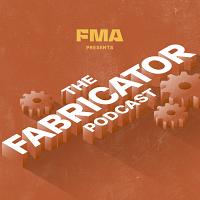Finding success in a new welding career with Jessica Considine of Sculpted Roots
This week, Jessica Considine – a welder, fabricator, and artist based in the Detroit-area – joins The Fabricator Podcast. She's the creative force behind Sculpted Roots and a full-time fabricator for the Department of Defense with Navistar.
In short, Considine exemplifies what a metal fabrication career can look like for the next generation of skilled tradespeople.
Also joining the podcast as co-host is Darla Welton of Brown Dog Welding and the Still Building America Series on thefabricator.com. This is the first of four podcast episodes she'll sit in as co-host with Dan Davis.
Considine talks about her path from jewelry maker to metal fabricator in her still young fabrication career. She also discusses how her carpenter father taught her how to work with her hands, how making jewelry honed her attention detail, the importance of an organized workspace in a fab shop, leveraging social media to grow her professional network, and learning to work a press brake.
Email us at podcast@thefabricator.com with any comments, questions, or suggestions.
In This Episode
Learn more about FMA's Nuts, Bolts, & Thingamajigs foundation and scholarship opportunities
Learn more about FMA's educational fabrication and manufacturing materials
TRANSCRIPT
Jessica Considine: I was pulling stuff out and he was like, "What are you doing?" And I was like, "I'm reworking, I'm remodeling. Okay." I'm like, "It's going to be good." I'm like, "I promise you." Some of the engineers will come through my section and they're like, "We know a woman is in the shop because everything's labeled and organized." And I laugh at that and I'm like, "It's about effectiveness and productivity, right?"
Sara Spring: The application period for Nuts, bolts and Thingamajigs 2024 spring scholarships is now open. All full-time students pursuing two or four year degrees leading to a career in manufacturing are welcome to apply. For details and eligibility requirements, please visit nutsandboltsfoundation.org.
Dan Davis: Hello, this is Dan Davis of the Fabricator Magazine, joined by Darla Welton of Brown Dog Welding, of Still building America series on thefabricator.com.
Darla Welton: Yes.
Dan Davis: And I don't want to say partner. Wife, partner, and friend. I'm trying to make a joke and now I'm screwing that up, of John Welton, our friend...
Gareth Sleger: Josh Welton.
Dan Davis: Josh Welton. Maybe I should just try to do this with as few words as possible.
Gareth Sleger: Who is John Welton?
Dan Davis: I got nothing for you. He's the inventor of Detroit style pizza. So we're in Novi, Michigan taping this, and before we get into a conversation with Jessica Considine, a young welder who has really kind of found her place in the metal fabricating industry and it's just kind of fun how she's gone about creating a career for herself. And the thing that really struck me, incredibly mature for being somebody in their twenties and the more conversations you have with these people, I feel inadequate that when I was their age, I was such just a loose piece of humanity with no real idea of what I should be doing other than going home and drinking beer and watching TV. So I don't know. It's one of the things, you have these conversations and she'll mention in the interview, her desire to set boundaries like I weld for a living. I'm not welding. The welding I'm doing outside of work will be for me. And I don't know, I just never had that drive or understanding. Just working with people is something that I think I got wise to the world at age like 45 or something like that, and that's not a good thing.
Darla Welton: So maybe it's finally going to happen for me this year.
Dan Davis: I'm not going to lie I really do feel like I reached a level of maturity...
Darla Welton: Is this what I have to look forward to?
Dan Davis: Yeah. So congratulations on this moment.
Darla Welton: Thank you.
Dan Davis: Keep me in loop, but I don't know. Where was your head space when you're in your twenties?
Darla Welton: Oh my gosh. I mean, Josh and I got married really young, so we were just young married people. We moved to California and spent every last dime we had going out, hanging out with our friends, going to comedy shows. We are at the Improv all the time and just having fun, being young twenty-somethings who weren't totally sure what we wanted to do. Josh was working in construction. He was working for our friend. I was actually a tutor at an all boys group home. They were all high school boys, and I had the time of my life actually.
Dan Davis: It sounds like a CW show.
Darla Welton: It was a little wild, but the kids were great and they looked forward to me coming, but I was just like, well, clearly working in boys group homes is not something I'm going to do in my entire life. So I was still trying to figure it out for sure.
Dan Davis: Yeah.
Darla Welton: Yeah.
Dan Davis: And yeah, I am sure change will come in Jessica's life as well. But yeah, I think I'm with you in terms of the twenties are just kind of about existing and just kind of taking advantage of both youth and what little money we did have.
Darla Welton: Exactly.
Dan Davis: Gareth, you were journalism major, so I don't know if there's a ton of money in stories...
Gareth Sleger: So I was just making bad decisions left and right. Getting a journalism degree and working in the newspapers. So yeah, I was also very poor.
Dan Davis: There You go. Yes. But I'm sure it built character.
Gareth Sleger: Yeah, character.
Dan Davis: There you go.
Darla Welton: There you go.
Gareth Sleger: That's the nicest way to put it.
Darla Welton: Building character.
Dan Davis: Some of my favorite meals are...
Gareth Sleger: Character.
Dan Davis: I love character field meals.
Gareth Sleger: I wasn't figuring out how to use a press brake like Jessica was.
Dan Davis: Yeah.
Gareth Sleger: I would just be overwhelmed and snap off my fingers.
Darla Welton: But it was her focus, right? So she went from jewelry to saying, "Oh wait, I could actually apply this elsewhere and use some of these skills and try something new and this could forge this career path for me." I just didn't have that sort of vision.
Dan Davis: Yeah. Maybe kids are smarter, I don't know. I'm okay with saying that. I know some people get kind of like, "Oh no, we had Hanna-Barbera cartoons. We're much smarter."
Gareth Sleger: Kids are smarter.
Dan Davis: There you go. With that in mind, let's just move on to the conversation with Jessica. We think you'll enjoy this and stay tuned. Goodbye. Bonsoir.
Gareth Sleger: Thank you.
Dan Davis: Thank you.
Sara Spring: This episode of the Fabricator podcast is brought to you by FMA. The FMA bookstore offers a variety of resources aimed at increasing your knowledge in metal fabrication and manufacturing. Featuring over 500 titles, including Spanish language materials, the bookstore is curated to provide practical instruction and a deeper understanding of the industry. Whether you're a beginner or an experienced professional, the FMA bookstore has all the resources you need. To explore the bookstore, visit fmamfg.org. And now back to the episode.
Dan Davis: Welcome back to the Fabricator podcast. I'm Dan Davis with the Fabricator Magazine. I'm joined by Darla Welton of Brown Dog Welding and a good friend, wife, partner of Josh Welton.
Gareth Sleger: You're like, "We're good friend?"
Darla Welton: We are good friends indeed. It's true. It's true.
Gareth Sleger: Really?
Dan Davis: Yeah. We learned about their story about how they met earlier today, which I think will probably be a separate podcast at some point.
Darla Welton: Right.
Dan Davis: But we're in the suburbs of Detroit today in Novi, Michigan, and our guest is Jessica Considine.
Jessica Considine: Hi.
Dan Davis: She is the creative force behind Sculpted Roots welding artist, but also full-time fabricator.
Jessica Considine: Yep, full-time fabricator for the Department of Defense now.
Dan Davis: Oh, wow!
Darla Welton: She just got a new job.
Dan Davis: Yeah, so I mean, yeah. How long is the new gig been going on?
Jessica Considine: It's only been going been two months, so it's super new to me. I came from custom fabrication, so I'm in a whole new field and industry, right. Going into now building prototype military trucks.
Dan Davis: Wow. How's that dynamic compare between the two metal fabricating environments?
Jessica Considine: It's been really slow these first two months because we're gearing up for it to be really aggressive.
Dan Davis: Yeah.
Jessica Considine: So I feel like I don't have a good representation just yet. It's very chill in the shop and my boss is like, you know what? These next couple months, once we start these three builds that we have going on, we're going to be on overtime, we're going to be working really hard. So just chill, get the shop to what you want right now and then be prepared for that.
Darla Welton: Because you're kind of the shop lead.
Jessica Considine: Yeah, I'm the only welder fabricator there.
Darla Welton: Oh.
Dan Davis: Wow.
Jessica Considine: So it's just me. Yeah. So I came from a position that I wasn't only welder fabricator there as well other than the assistant plant managers, and they were in my position at some point but had moved up, so I took their position. So yeah, it's kind of funny, I'm a solo once again, but I work with a lot of heavy duty mechanics, so those are my main coworkers for the most part.
Dan Davis: Is that dynamic you get specific bill prints that you have to put together or is it kind of like, "Hey, we need this?" Where's the input coming in terms of what you work on?
Jessica Considine: So what I've seen so far from my short stint there, it's I'm doing a lot of modifications to already built trucks that I wasn't a part of. So they'll go into testing out in different cities and states and stuff, however that is, it's really based off of the contracts that they get. And then they'll come back and say, "Hey, this is what failed and this is what needs to be fixed and we need to rework it." So I've gotten a lot more prints in that aspect. I'm gearing up to do three builds from the ground up, so I'm not really sure what that's going to be like. I'm assisting a lot in things. I'll be welding a lot of stuff, but I think the mechanics will use me and their aspects as well, whatever they need when they're short on hands, which I don't have a lot of mechanical experience in that way, so I'm kind of excited for that because it just adds another skill onto me.
Dan Davis: Right.
Darla Welton: Oh, absolutely. How big is the shop or the company? Is it a smaller?
Jessica Considine: No, so it's actually a pretty big company. It's Navistar Defense.
Darla Welton: Okay.
Jessica Considine: So they're the biggest manufacturers of MaxxPros, which are war defense vehicles basically. Especially, they were built for explosions to withstand those and not have any fatalities, but they've kind of become a little bit more used for everyday use for the guys in the military and whatnot. So yeah, my understanding with them is that they're pretty large and so we're just the prototyping shop, but our actual manufacturing facility is out in Mississippi and there's like 600 employees there.
Dan Davis: Oh, wow.
Jessica Considine: Yeah.
Darla Welton: Interesting.
Jessica Considine: Yeah, there's 300 welders and then it goes from shop managers to engineers to purchasers.
Dan Davis: So you're really kind of creating the WPS for some of these jobs.
Jessica Considine: Yeah. That's what it kind of feels like so far. And I'm waiting to get my certification specifically in Flexcore on armored steel.
Dan Davis: Yeah.
Jessica Considine: So I think they'll send me down in Mississippi because most of those guys, because they're manufacturing all of these heavy duty trucks that most of them are certified for.
Dan Davis: Wow.
Jessica Considine: Yeah, so those guys, I think they're CWIs more based out of there instead of my shop where.
Dan Davis: Do you have a lot of experience with that armored plate type [inaudible]?
Jessica Considine: No, I have no experience. Nope. I have no experience. Honestly, was just looking through the previous guy who had worked there. I was looking through his notes and his books and I found some WPS's from 2008 and I was like, you know what, I'm going to go based off of them. I was like, I don't have any other newer additions of them. So I was just practicing and gearing up for that moment that I get to go down there and certify. That's what I'm basing it off of. And honestly, just a little bit of research.
Dan Davis: Yeah.
Jessica Considine: So I've learned that much. And I know that for armored steel, because it's just so hard in that it needs to be preheated to a certain temperature, and I think that's the main thing with it is that it has to be preheated.
Dan Davis: Yeah.
Darla Welton: Now I feel kind of useless because I feel like if Josh was here, you guys would just go at this conversation because obviously that's a big part of what Josh does and his job, and he's not here because he's getting new Mill Certs right now.
Jessica Considine: Okay, nice.
Darla Welton: Yeah, so he is down in Lyme, Ohio doing that.
Jessica Considine: Oh, okay.
Dan Davis: Yeah. Just the plug, I mean, Josh and Darla may have helped put those blog entries together, but when he was over in Iraq kind of doing some work on site, that was pretty good reads.
Jessica Considine: Oh, yeah.
Dan Davis: But yeah, I mean, yeah, there's definitely one person missing from this conversation. They probably should be here to the maximize the enjoyment.
Jessica Considine: I'm still so new to it and I'm learning slowly but surely about it. I'm more involved with the engineering aspect, just talking to the engineers pretty consistently about because they understand what their previous builds have been, but now we're going into new ones, new type of trucks, so they're like, what is feasible? Will this work? And this boss work for this? So it's interesting in that way. I don't think, at my last job I wasn't so involved with the engineers, so it's very new for me like that.
Darla Welton: What a great opportunity.
Jessica Considine: Yeah.
Darla Welton: I love it.
Dan Davis: So I'll ask the question I end up asking not only people guess on here, but people I meet at other companies because metal fabricating you run into, you forget everything gets made and you're like, "You're the people who make that." And so did you think you would end up doing a job like this at one time?
Jessica Considine: No, I really didn't have an interest in the military industry. I didn't really think that's where I was going. My first job was custom fabrication and I had stayed there for three years and I just was outgrowing the work that they were doing. So I just started looking for new jobs and it ended up... My interview. My first interview with them, the shop manager was just so enthusiastic and he was so fun and he made me feel very welcomed and already I had the job, even though there were other candidates still there, and it just seemed really cool and it was better pay. Out of all the jobs that I had applied for and had gotten offers for, it was the best pay. So I was like, I'm just going to do it and just try it.
Dan Davis: What number of jobs is this in your career?
Jessica Considine: This is two.
Dan Davis: Okay, all right. I just wanted to get a timeline going here in my head.
Jessica Considine: Yeah, this is just two.
Dan Davis: All right.
Jessica Considine: So this April, this is my three-year mark being a welder fabricator in an industry.
Dan Davis: So background
Jessica Considine: My background basically, I actually started off as a jeweler and then I kind of worked my way into metal sculpting and then I was a really bad welder. I liked fabricating and I liked being creative, but I was like, I really am bad at welding and I wanted to do fine art. So I decided to go into the welding program and it just opened up a lot of avenues for me and opportunities that I realized I could make a full career out of it and have my own welding shop and make my art on the side or do whatever I wanted. But I was like to get into the industry, I saw that it was going to be an advantage for me, whether I took it far within the welding industry or I took it into my art.
Dan Davis: Right, wow. It really flips the script sometimes. Most people start out on kind of the business, not business. Metal fabricating, custom fab, as you mentioned, kind of work their way to the art for creative outlet, but you kind of started backwards a little bit.
Jessica Considine: And so I did jewelry classes in high school and I really enjoyed it. And I looked for art colleges and they were so expensive and I did not want to be in debt and I just wasn't interested in that. So I had found a jewelry shop that had bench jewelers on site and they needed a cashier. So I was like, you know what? I have some jewelry experience, I'm going to be a cashier and maybe I can work my way into apprenticeship with them. And that ended up happening and I enjoyed it, but it was better to make my own jewelry than it was to really just do it like that as a job. I didn't have the passion for it. So my jewelry teacher had recommended like, "Hey, the local community college you're going to has a metal sculpting program. You should look into it." So yeah, I did that and then I saw that they had a welding program and I was like, I'm just going to get my associates, I'll become a certified welder. I'll get some experience. They had a small CWI classes and I thought that was really interesting. I was like, I see that you might not always want to stay in the shop atmosphere. You might want to move forward with it. So I was like, I think there's a lot of opportunities for me to go forward.
Dan Davis: So you saw the pathways?
Jessica Considine: Yeah.
Dan Davis: Wow. Okay.
Jessica Considine: Yeah, and I just knew that, like I said, I could still always make the art, but I just wanted to be really good in my skill.
Darla Welton: So interesting. So you took a jewelry making class in high school. Where did you go to high school?
Jessica Considine: I went to Stevenson in Livonia.
Darla Welton: Okay.
Jessica Considine: Yeah, they had a program. It was really small. It was one of their electives and I just never stopped taking it. I started it freshman year and I kind of became a guinea pig for my jewelry teacher. So because I continued to take the classes with her, she would give me projects and just different books to read up on stuff and say, "Hey, can this beginning class or this advanced class do a project like this? Can you figure it out?" So I would do stuff like that for her in school and out of school. So I liked it. It was fun.
Darla Welton: Interesting.
Jessica Considine: It was smaller torches, but it still was fun.
Darla Welton: Did they have tuck classes? Did they have welding classes or auto shop?
Jessica Considine: Yeah, I think it was more auto shop and honestly I didn't even know really about welding in high school. I had no interest in it. I didn't really know much about it. I didn't recognize it for that. But yeah, I think they had an auto shop, but I didn't really know. I wasn't affiliated with it. I was just in the jewelry section.
Dan Davis: Yeah.
Darla Welton: And then, sorry, go ahead.
Dan Davis: No, no, I was just saying amazing what branding can do if that hadn't been called metal sculpture, maybe you end up in the class.
Jessica Considine: Yeah. Maybe.
Darla Welton: Right. Exactly. Well, then you said that the community college had a metal sculpture program.
Jessica Considine: So you could get your certificate in metal sculpting and they had different level of classes as well.
Darla Welton: Okay.
Jessica Considine: And you learn the basics of welding, but you didn't really get into the depth of it. You learned how to just do it easily.
Darla Welton: For putting sculptures together.
Jessica Considine: Yeah, it wasn't a structural aspect. It was more about being creative and finding your creative path than it was about really understanding welding as a whole.
Darla Welton: So where did you go to community college?
Jessica Considine: Schoolcraft.
Darla Welton: Schoolcraft. Okay.
Jessica Considine: Which is also in Livonia.
Darla Welton: Yes. And Schoolcraft is actually known for their welding program.
Jessica Considine: Yeah. They're known for their nursing program and their welding program. They were actually in the same facility, but a couple of years back they actually went to, they took their welding department to a whole new facility and it feels... I had checked it out once it was their new facility and it felt more of a shop where before it felt like we were in a school. We were actually in a school, and it was kind of weird. We would have nurses on one side and then welders on the other, and it's like...
Darla Welton: That is odd.
Jessica Considine: Yeah. Right. They would be doing whatever they could, and it was just weird to kind of see it. It didn't feel like we were totally in a shop atmosphere.
Dan Davis: Who needs PPE? We have nurses.
Darla Welton: All the nurses are practicing on the welding students all the time.
Dan Davis: There go burns again.
Darla Welton: That's so interesting. And so you did a associate's program at the college then?
Jessica Considine: Yeah, so I did associates. I got multiple certificates that came with it, and then I got certified through AWS there too, because they were accredited facility.
Darla Welton: Oh, right, right.
Dan Davis: How did that compare to the jewelry torch thing? Did anything carry over at all?
Jessica Considine: Yeah, I think the aspect of soldering carried over with TIG welding because I was so precise. Everything's so small when it comes to jewelry. So that really carried over with TIG welding in the sense of I was using a smaller torch, it's a smaller flame. You're looking at more of the details within it compared to stick welding or flux core or MIG welding. So I think that really helped me, especially with a steady hand. You don't always need a steady hand, but it really helps. So yeah, the jewelry carried over more into TIG welding.
Darla Welton: I could see how that would cross over really well. Josh actually has a very unsteady hand. The thing that has worked for him is he so unsteady and shaky that he shakes kind of rhythmically, and so that's what has made him a good TIG welder.
Dan Davis: His TIG weld look really good.
Darla Welton: Yeah. Yeah, he does beautiful TIG work, but I think that's why he has a issue that works for him.
Dan Davis: Wow.
Jessica Considine: Yeah, you just got to see it all. A lot of my teachers had really unsteady hands and made it very apparent, you don't necessarily need it. It could be an advantage for you if you do, but it's not necessary at every moment.
Darla Welton: It's so interesting how you can even tell Josh's welds look different from my welds, look different from your weld. You can sort of read welds as a signature once you get used to looking at them, you know who did it just based on their own personal set of skills or how they've made their own adjustments to be comfortable. It's pretty interesting.
Jessica Considine: Yeah. Yeah, I would agree that your weld is your signature for sure.
Darla Welton: Oh, definitely. Yeah. That's something I have learned, especially I've probably been welding the same amount of time as you, because obviously Josh has been doing it for years. But I finally said, "Okay, take me out to the shop. I want to learn. I really want to get into this." And so he just set me up with the TIG welder and I went at it for four and a half hours one day while he was cleaning the shop, and he would just come over and look over my shoulder, give me a few tips. But yeah, so I've probably been doing it the same amount of time.
Dan Davis: You started to learn with TIG?
Darla Welton: I did.
Dan Davis: Wow. That's kind of....
Darla Welton: I did.
Dan Davis: How did yours, your education start?
Jessica Considine: Mine started with basically MIG welding and then stick, and then TIG was the last one because I was a little nervous about it.
Darla Welton: That's more common.
Jessica Considine: Yeah. Yeah. I would say yeah, that's more common, but I feel like you started off with the hardest one, so maybe it made the other ones a little bit easier for you.
Darla Welton: A little bit, but I just feel, I don't know. I feel like I have so much more control with TIG, so. And most of the stuff that I'm doing in our shop, I'm just practicing and making joints and...
Dan Davis: Amusement park rides.
Darla Welton: Exactly. Yep. Yep.
Dan Davis: It don't need to be that safe.
Darla Welton: Look for my signature on at your next county fair.
Dan Davis: So when you graduate, what do you think you want to do and where do you end up doing?
Jessica Considine: Yeah, so pretty much I graduated. I went on a nice vacation after the few years that schooling took.
Darla Welton: Good for you.
Jessica Considine: Yeah, it was great. I loved it. I thought I was going to end out in California for a little bit of time, but I didn't really care for the pay out there for welders. It was lower than Michigan. So I came back and I just started looking for jobs and I didn't know what field I wanted to, so I just was honestly applying to them all. And I was like, I'm just going to decide once I get the offers, right. And actually, so I had gotten my first job when covid hit in March of 2020. So a lot of the offers that I had gotten kind of dissipated because they were like, we're shut down. Covid has shut us down. The state has kind of shut down at the moment. But this one shop decided that they were going to transition what they were making into being essential. So they started making, for oxygen tanks, holders... And holders for hospitals and stuff, and different stuff for grocery stores. You saw those Plexiglasses that would be in frames.
Darla Welton: Oh, right.
Jessica Considine: So they started making stuff for that, and they said, "Hey, we need you. Will you take the position?" And I was like, "Yeah." I'm like, everywhere else kind of had dissipated for me just because of the circumstance. So I took it and it ended up being one of the best ones for me. They transitioned after we started getting a little bit out of covid, they transitioned more into custom fabrication a lot for universities and grocery stores. It was more like art deco in my opinion, that was still structural based. So I had production base in there, but that didn't really get my attention very much.
Darla Welton: Right, right, right.
Jessica Considine: It was more of the custom fab that I stayed.
Dan Davis: But it was part of the mix.
Jessica Considine: Yeah, it was part of a mix. The production was keeping money flowing in, and this custom fab was just for them to get their name out there more and maybe get into that area a little bit more for them. And they had great equipment. They had a lot of CNC based equipment. And at my schooling we learned a little bit about coding, and I had a CNC plasma class, and I just thought it was really interesting. And I saw that they had that along with CNC brake presses and a CNC Bridgeport Mill. So I was like, I think this would be a good opportunity for me to advance my skills in that area.
Dan Davis: So you felt like you got a pretty well-rounded introduction to a lot of that stuff?
Jessica Considine: Yeah, I feel like, because at one point they had told me at my previous job that there was a person running each one of these machines. So the fabric... Or the welder was just really a welder. Everybody was doing the prep work for them, everybody was getting it ready, and they were just welding out stuff, whether it's making the fixtures or finishing them. So when I came in because of covid, they had to get rid of a lot of employees, and I took over everybody's position. So yeah, so it went from like 40 people running all these machines to myself running these machines, which really helped me in my skill to progress really quickly, which may not have been the circumstance at other places if I would've chosen to go there. And it was just a luxury to be able to use heavy equipment like that.
Dan Davis: Right.
Darla Welton: So cool. I feel like, I'm trying to think. When I started, I'm always looking for people out in the industry are doing really interesting things. And I think I started following you 2021, maybe.
Jessica Considine: Yeah.
Darla Welton: And I was trying to figure out, I'm like, "What is this girl doing?" I don't think it was your shop, but she's in a shop and she's by herself and she seems to be doing everything. This is really interesting. What is going on here? And then I think I just got in touch with you around FABTECH or before, a little before that.
Jessica Considine: Yep.
Darla Welton: Yeah. But it's always interesting who just comes up in the feed. And of course, I'm always looking for women welders. So it was really fascinating to see you in that shop by yourself building so many different things. And what was really cool too, is seeing that your employer was allowing you to post all the stuff from your job.
Jessica Considine: Yeah. They were super cool with it. They didn't have any problems.
Darla Welton: Yeah.
Jessica Considine: I would hope that... I was trying to get them to utilize it more in their marketing aspect because they lacked in that area. I wanted more custom fabric. I wanted big projects. That's what I liked to do.
Darla Welton: Right.
Jessica Considine: It was fun doing that stuff. I would need a hand or two just to move some stuff. But other than that, it was just me. So I tried to get them to utilize the content that I was making. I didn't really have a social media presence until probably about 2021 when I started doing bigger builds, and I had started to really advance my skills within fabricating.
Darla Welton: Yeah, yeah.
Dan Davis: It's such a natural for a shop to lean on that being that it's so visual. I mean, you go to any shop's webpage and they're going to have the gallery of work, so you get an idea of what exactly they can do. Did they not grasp it, do you think?
Jessica Considine: No, I don't think they did. I don't think they understood that through everything that I was making, which they were totally fine with, it didn't take away from my work for the most part that it was creating sponsorships, it was creating other things, like me meeting people, all these things that social media had. I don't think... I think that they weren't progressive enough in that way. That they just couldn't grasp that.
Dan Davis: So I was on your Instagram page yesterday kind of brushing up for this. You're kind of doing some videos for your current employer too, right?
Jessica Considine: Yes.
Dan Davis: Because I saw you reworking the welding area.
Jessica Considine: Yeah.
Dan Davis: It's really kind of the opposite of what you see a lot of these, for lack of a better phrase, welding influencer. You know what I mean? It's really kind of nuts and bolts type stuff, and you're getting a free pass into somebody's work environment. It's actually...
Darla Welton: It's so cool.
Dan Davis: It really is from a...
Darla Welton: I love it.
Dan Davis: For people that don't understand what fabricating is, I mean, you're kind of showing them directly, A, the setting, B, the product. You probably see the skills as well.
Jessica Considine: Yeah, I'm trying. I'm still figuring out that aspect of it, showcasing it. Now, I've signed a lot of NDAs.
Dan Davis: Correct.
Darla Welton: Exactly.
Jessica Considine: So there's only...
Dan Davis: I'm surprised you've been able to talk much as you have.
Darla Welton: Do you have a security clearance?
Jessica Considine: No.
Darla Welton: Okay. Okay.
Jessica Considine: No. So most of them are heavy duty mechanics too. I think at some point I might get to that point, but at the moment it's mainly them for it.
Darla Welton: Yeah. I'm like, Josh can't post nothing, no photos. They have certain areas where they can't take their phones at all or they have to put the tape over them. It is very little what he can share. So that's why I'm always so impressed that you can share so much of what you're working on. Well, so far.
Jessica Considine: Yeah, so far.
Darla Welton: So far.
Jessica Considine: Once we get into these new builds that it's from the ground up, there's nothing I can share from that, basically. Maybe a weld or two, but there's not much. And I had talked to them about it, like, "Hey, I get sponsorships from this stuff. It is part of just what I like to do." And they were okay with it. For the most part. They just say no photos inside the truck. It depends on which one it is. But there's stuff that's very commercialized at this point that has been out for 10, 20 years, they're okay with. Because they take it out to different events and everybody's taking photos of it, right.
Darla Welton: Right.
Jessica Considine: So yeah, there's certain things I can share. There's a lot of things that I can't share, which is kind of a slowed down, I guess, my content creation because of it and that we're gearing up for a portion of my builds that I won't be able to share.
Darla Welton: I just think it's so cool that we got to see this young woman lead of this military prototype contractor just setting up a workshop, getting ready for this big build. That's so awesome! I feel like that's just incredibly rare.
Jessica Considine: Yeah.
Darla Welton: And I mean, Josh works with several, I can't even tell you. It's a few hundred guys who could be welder fabricators. They're all running metal shop, but they have one woman in their shop who is just hired. So to see you getting this opportunity is awesome.
Dan Davis: How's that dynamic been?
Darla Welton: And see you run with it.
Jessica Considine: It's been great. I love the guys that I work with. They've all been very helpful with me, especially because they know a little bit in the welding area, but that's not their skill. So it is been nice that they've been helping me out in the mechanical side of it as well. They can see that I am excited. I'm young, I'm excited. I have a lot to offer. And yeah, they've been mentors for me.
Dan Davis: That's awesome.
Jessica Considine: Yeah, I don't feel... I took the job because I felt really good about it, and that's kind of why I took my last job. I felt really good about it as well. It was a good atmosphere. And there's no other women within the shop atmosphere. There are other women that are engineers and stuff that I get to work with. So I'm like, okay, there's progression here. There's things like I am surrounded by a lot of good people. So yeah, that was the main reason that I had taken the position and that my shop manager who I had interviewed with had said, "This is your shop. You're the only one. You'll basically be touching all this equipment by yourself, so make it how you want it right to your fit, whatever that is to you." And I just immediately from the first day I just did that. I was like, I'm ready to make it how I see fit.
Dan Davis: Literally on the forklift.
Jessica Considine: Yeah, yeah, exactly. I was pulling stuff out and he was like, "What are you doing?" And I was like, "I'm reworking. I'm remodeling." Okay. I'm like, "It's going to be good." I'm like, "I promise you." And some of the engineers will come through my section and they're like, "We know a woman's in the shop because everything's labeled and organized." And I laugh at that and I'm like, it's about effectiveness and productivity. That's what I need in the shop. I need things to be by the mill or by the lathe, and I need all my welding stuff related to that area as well.
Dan Davis: Is that something they cover during your welding education?
Jessica Considine: No.
Dan Davis: Or is that just common sense?
Jessica Considine: No. That's just something that...
Dan Davis: The speed, no. Sometimes it's just common sense.
Darla Welton: And if they did...
Dan Davis: And some people don't have that. Thank you.
Darla Welton: If they covered that, Josh missed those classes.
Dan Davis: Burned.
Darla Welton: Just saying.
Dan Davis: Somewhere Josh is like, "Somebody's talking about me."
Darla Welton: Oh, definitely.
Dan Davis: That's funny.
Darla Welton: No labels in our shop.
Dan Davis: Is that something you introduced to your last job too? A little bit more organization?
Jessica Considine: Yes. My last job, it was one of the best shops that I had seen out the ones that I had interviewed with, but still, it was a mess. And I just could see, we just have things piled on top of each other. We have drawers that are full of sunflower seeds, and I was like, I don't want to use this. I want to use this. And we had downtime because of covid, right? There were slow moments and I was like, this is a time for me to work on the equipment, get it back going properly, clean it, because it's like your equipments going to last longer if you take care of it. And the same with the shop, like it gets really messy when you're doing builds, but there's a good time afterwards unless you have another build going on right after to clean and organize and just know where things are or things get lost, and then it's like you're just losing money by buying more stuff when you don't know where it is.
Darla Welton: Right.
Dan Davis: It seems like you have a comfort in these environments. Did you grow up around people who maybe worked on cars or?
Jessica Considine: No, I didn't. So a lot of my family is tradeswomen and men, but more in the carpentry and tile working and engineering aspects.
Dan Davis: Oh, okay. Working with hands then.
Jessica Considine: Yeah, working with hands. My childhood was working with my father and rough and fine carpentry, so that's really got my passion into working with my hands.
Dan Davis: Gotcha.
Jessica Considine: But for some reason, metal just appealed to me more than carpentry did.
Darla Welton: Playing with fire.
Jessica Considine: Yeah. But these days I really enjoy carpentry with my dad especially. I appreciate it a lot more. And he's getting older, so it's like I'm really now starting to take everything he has to say into account because it's like I want to be able to work on my house.
Darla Welton: I could see some of those skills coming into play. Some of the knowledge you picked up from that as you were building your, were you calling it your She Shed?
Jessica Considine: Yeah, my She Shed, yes.
Darla Welton: Yeah, she was building a home shop space, which is really cool. So Josh and I have been trying to figure out, our schedule's just been mad, but we want to come down and do a video in our personal home shop space and share that with everybody. So are you mostly doing personal art projects later then?
Jessica Considine: Yeah, right now in the shop, I'm mainly doing stuff for my house because I'm like...
Darla Welton: Awesome.
Jessica Considine: That's where it's keeping my passion to do welding outside of work, right? Because I am doing a lot of modifications and working on cars and trucks at work that I don't necessarily want to do repairs outside of it. I want to work on things that are for myself, and hopefully it starts to evolve that I can do functional pieces maybe that are more art deco for other people at some point. But yeah, it's a lot for myself. Because I had bought a new house with my partner August of 2020, and it was a grandma house, so I needed a lot of work. So there was a lot of renovation and remodeling that we were doing, and she had this small shed in the back, and that's where I decided that's the perfect place for me to have my own home shop and do what I want there and enjoy the welding outside of work.
Dan Davis: Yeah.
Darla Welton: Where you really get to explore and be creative and mess up whatever you want to mess up without it costing your employer.
Jessica Considine: Exactly. Exactly.
Dan Davis: Right. It is nice that you found that balance where you can enjoy it while at the same time doing it every day. I don't know if other people find that.
Jessica Considine: Well, yeah, people will say especially as well, people are always asking you, "Can you fix my boat? Can you fix my trailer?" Even the engineers at my shop, and I just politely decline, "I'm sorry, but outside of work, I do what makes me happy." You can bring it into the shop. I'll do it in the shop if it's cool with the shop manager, but outside of work to keep that, my passion and that drive going for myself, I have to do things that I need, that I want, right? And sometimes it is for other people, but it's still within my style of things.
Dan Davis: Right. What kind of advice would you offer somebody who is just getting involved in welding? And I think one of the things that's very difficult is you hear a lot from the welding schools, "Come out and make all this money." And they get out and you've gone through it. No one's throwing a... What do you call it? Armored truck full of money at you, right when you graduate?
Jessica Considine: Yeah.
Dan Davis: But there are pathways. I think you see that. What kind of advice would you offer to a younger person?
Jessica Considine: I think that getting your certs is really helpful, especially as a female. It really helped me when I went into my job interviews because it showed that I had just this step up to myself, that I had commitment and I was able to produce in high stress situations. So I think that if you are in school to get those certifications, it's not always necessary, but I think it's super helpful. And then if you're not in schooling and you're just trying to get into it, sometimes you just got to go for the shop. And it doesn't mean that you have to stay there. It's just get some experience and get out and get to a new place that you feel that fits your work ethic or the environment for yourself and take everybody's advice. And it might not always be the best, but there's a lot of good mentors out there, and most people are really willing to help you if you're willing to put the work into it. Ask the questions, and it's okay to fail. There's so many times that I failed at the beginning that I was just like, this is what it's like. Because unless you fail, you'll never get to that master, that master aspect and your skill and everything. So mainly just it's okay to fail, keep the drive going, whatever that is, and make sure that you're happy with the place that you're at.
Dan Davis: Yeah. Make the most of the opportunity.
Jessica Considine: Yeah, make the most of the opportunity, definitely.
Darla Welton: Is there anybody who you... Do you have a particular mentor or even people that you follow on social media or online or that have really influenced your welding path or who you kind of go to for encouragement?
Jessica Considine: Yeah, so I've actually found a really great group of women welders. And that's really been helpful just talking about what industry is like and kind of how they got into it. And so the welders, which are Lettie and Rachel, they're the ones who created that nonprofit. And it was, it's classes for women, just the bases of it, the basics of how to start welding. And they did an event out in Arizona and they had just contacted a bunch of us through social media and said, "Hey, do you guys all want to come out and stay in an Airbnb and we can get to know each other?" And we all went out there. And from there it's like we've all just been able to connect and keep with each other and when we need advice, talk to them. So yeah. I think there's a lot of great fabricators out there, but the women welders really have... They just stand behind each other really well, and they've been really helpful with just job opportunities, just influencer opportunities as well, and just supporting each other in that way. So I look up to a lot of them. For the most part.
Darla Welton: I love the women welder community. I have so many amazing friends, and I'm not even a career welder. I love the industry. I love seeing what women are doing, but it's incredibly powerful to see what these women are doing in community, whether they're in the same area, geographical area or not. Like you say, we just got together out in Arizona, and the power of that just seems to, and the influence of that just seems to radiate outwards and I see how important that community is. I belong to a few groups on Facebook, and those groups too are so encouraging to one another and they're always helping each other. Like, "I'm struggling at this job," or, "Can you look at my welds and tell me what I need to do?" And it's interesting. I don't know that there's guy welding groups like that.
Jessica Considine: Yeah. That's a good point.
Dan Davis: "Your weld sucks. You ain't good at this."
Darla Welton: Oh my gosh, right. Egos are hilarious in welding. I'm sure that comes up in circles of women too, but just, I don't know, the comradery is so awesome. I love being a part of it, just looking for people to share the platform with or whatever it might be. But I've been so inspired, and I mean, even you being so young and young in the industry, I'm inspired by that. And I love stories like yours. That's what really fuels what I do, what Josh does, and just getting to share these stories and help other people get excited about the industry.
Jessica Considine: Yeah.
Darla Welton: Yeah.
Jessica Considine: So yeah, a few others that I really like are, I know that you guys recently did it on your guys' magazine. I was just reading about Ivan. I think Ivan's a really fantastic welder and artist. I think he's really...
Darla Welton: He's so talented.
Jessica Considine: He's super talented.
Darla Welton: So nice.
Jessica Considine: And I found Lou because of Metal Shop Masters, and he is super skilled and a very smart guy. I mean, he can run machines like I've never seen. So those are two people that I'm able to talk to and just have good conversations with that relate to art and welding as well. And then specific Arc, TIG welding, he's the guy from out in Canada, but he's really smart. He's done a lot of aluminum welding most of his career, and now he makes these crazy 3D TIG welds out of aluminum, and they're like eyes and they're very spiritual looking, but they're really neat. He just really manipulates stainless steel and aluminum, and I appreciate guys like that. Like they're using their skills and talent within an art aspect, but still structurally based. So it's progressive.
Dan Davis: What have been some of the challenges that you've encountered during your early part of your career?
Jessica Considine: I think setting boundaries with people was kind of a big thing that I had to learn. I was eighteen when I had started just even metal sculpting. So it was hard for me to understand what a boundary meant within a professional aspect. I just wanted to be buddy buddies with everybody and just kind of go with the crowd sometimes. But I realized that setting boundaries was really important for me to get the respect that I needed as a professional, especially a woman in a male dominated field. So boundaries are really hard for me to gather, and it took a couple of years for that to really set up and not let people walk over me or make me feel minimalized for just growing and not knowing everything from the beginning.
Dan Davis: Right. No, it came into my head when you were mentioning the guy wanting his trailer fixed as...
Jessica Considine: The boundary.
Dan Davis: But to be able to say that is a very mature thing.
Darla Welton: It is.
Dan Davis: Without...
Darla Welton: I'm impressed.
Dan Davis: So without totally pissing off the person asking, and yet still being able to say politely no and kind of maintain, as you say, your boundaries. The thing that I am talking with you is there's a certain level of maturity, and you've probably put in three years already kind of learning how to work in a workplace, but it can be so difficult for a young person in general, much less as you describe, a woman in a male denominated... A male dominated field. So there's so many things that young people have to learn about being in a workplace, and it's something as simple as that. I think it applies, I mean, obviously from your perspective as a woman, but I think that that's a lesson for a lot of people.
Jessica Considine: Yeah. One of the mechanics at my shop right now, he's super smart and everybody goes to him to fix their vehicles, but he's getting exhausted from it.
Dan Davis: Right.
Jessica Considine: And I told him, I'm like, "You got to set the boundaries and just tell them, no," Like, "I am sorry, but I understand that I can fix it, but this is my time to do what I need to do for myself." But yeah, most shops in the welding industry, there are professional aspects. There are very professional shops, but most of the time it's welding, so you're doing whatever you want and you're messing around, you're pulling pranks on people. So to keep that professionalism was kind of difficult to learn what it is to be a professional welder and shops that are not necessarily that high of standards when it comes to that.
Dan Davis: Right. Do you feel like you can make a long-term career as a welder, or do you feel like your interests may take you elsewhere to explore kind of different paths that may slightly go off that welding path?
Jessica Considine: I think that I'll stay within the welding industry. I don't know if that'll move up to becoming a CWS or a CWI. That's what I hope for. That's what I'm looking for within a five to ten year plan for myself. But I definitely feel like there's just so much to learn in welding, and there's just a lot of opportunities to offer one. Even in the sales of welding, people have really good careers in it, and they go to really fun functions, and then they're still involved in it. So I think that I'll stay within the welding industry. I don't really see myself veering off from that. I'm just not sure what aspect that it'll be.
Dan Davis: Yeah. You think you'll keep your hand in kind of actually welding, whether it be as a professional or maybe during your off time?
Jessica Considine: Yeah, I think that I'll always be welding.
Darla Welton: You love it.
Jessica Considine: Yeah, I love it and it's fun and it's a cool thing to tell people like, "Hey, I'm a good welder. I know how to weld," and there's a fun aspect to it, and it's exciting. It's thrilling. Not everybody gets to say those things, and I just like working with my hands in that way, so I don't see myself not continuing welding, whether it's at my own home shop or continuing to stay at a shop.
Gareth Sleger: I have a question. I know we're talking a lot about welding, but on your Instagram page, you have a lot of videos of you working on a press brake and working through the pain points of trying to trick the press brake to bend the plate the certain way. What was that transition like learning how to use a press brake and two benders?
Jessica Considine: Yeah, so it was pretty difficult at first because I really didn't have a lot of experience working machinery in a fabricating aspect like that. And my assistant plant manager at my last job, he was in my position for a while, so he actually helped mentor me in those ways. Also let me fail a lot and was like, "The only way you're going to learn is if you fail." So I just started doing projects and started making up prints on my own that just kind of look like something that would be complicated for the machine and just testing those abilities of it, because you can't always buy tooling when you have a job that needs to get done right away. So it was working with that aspect of like, yeah, how am I going to manipulate this machinery to get what I need out of it for this moment exactly. And a lot of it, I use a lot of math. I didn't think I was going to use so much math and I didn't think I would be so good at it. Right. I wasn't so interested at that point. But then you get into a passion and then you get into a lot of CNC based machines and it's all equations, right? The equation will get you where you need for the most part. So yeah, it was just a lot of practice of just doing my own stuff and then a lot of different jobs that required me to just get it done and move forward with the next one.
Dan Davis: We're literally going to take that little section about math. I'm going to share with my wife, and we're going to build up math fans out there.
Gareth Sleger: Your wife's a math teacher.
Dan Davis: Yes.
Jessica Considine: There you go.
Darla Welton: Oh, is she?
Gareth Sleger: For some context.
Dan Davis: Yeah. So that's very important. Thank you for sharing that point.
Jessica Considine: It really is.
Dan Davis: You've made her day, even though she's not here.
Darla Welton: All the math teachers across the world, thank you.
Dan Davis: Right.
Gareth Sleger: All the kids who say, "I'll never use that math."
Dan Davis: Well, I mean, there's enough videos of that and enough comedian bits.
Darla Welton: There really are. Oh my goodness. Honestly, I was a terrible math student, and I realized later in life, I mean literally, I always got all A's, and then I'd get a C minus in any sort of math. And yeah, I kept trying, and I kept taking higher level math classes thinking that the harder it got, I was going to get better at it.
Dan Davis: Yeah.
Darla Welton: Later in life, I realized though would've had, if numbers had color association, that I would've done a lot better. So that is how later in life I became much better at math when I needed it was color association, which is really strange, but that's how my brain works.
Dan Davis: Never be afraid of C's. There's a saying in my part of family, "C's get degrees."
Darla Welton: That is true. That is true. Yes, yes.
Dan Davis: We've even lowered that sometimes for occasional class where D's would get degrees, but we want to shoot a little bit higher than that.
Gareth Sleger: Dan, I rolled that through college.
Darla Welton: Oh my gosh.
Dan Davis: There's always that.
Gareth Sleger: So did you welcome that was working in the press brake or was it something you were anxious about?
Jessica Considine: No, I actually welcomed it because I wanted to get better in that area. I felt smarter, I had more confidence, and I knew that I would be more successful going into further into my career if I could just nip it in the butt and start learning it now and find the fun out of it. That's basically what happened. I was doing a lot of programming and operating of these machines, and it was like I had to learn it. But it was fun because there was an end result for me that I could physically see where when you're in school and there's really no end result of a project that you're seeing with it. So yeah, I guess my brain associated in that way. I could see my end result and know, yeah, I got this to the exact print that it needed to be.
Darla Welton: Do you have any processes that you really want to learn that you haven't spent a lot of time on or a dream project?
Jessica Considine: I'd like to get better at TIG welding, especially stainless. My last job, I did a lot of aluminum TIG welding and not as much stainless. So that's like the...
Darla Welton: That takes a lot of skill.
Jessica Considine: Yeah. And that's the one area that I would say that I lack in. At least the one material. I think I'm okay in it, but I think I have a ways to go before that.
Darla Welton: Come hang out in our shop.
Jessica Considine: Okay, there you go.
Darla Welton: Let's figure that out.
Jessica Considine: Okay.
Darla Welton: Let's come and we'll do a stainless day.
Jessica Considine: Yeah.
Darla Welton: Yeah.
Jessica Considine: I love that.
Darla Welton: It'd be so fun.
Jessica Considine: Yeah. So it's not a specialized material, but not every shop uses it, right? It's a more expensive material to use for a lot-
Darla Welton: Definitely.
Jessica Considine: Sanitary reasons, right? Things of such. So yeah, I'd like to move further in that for myself, for my own ego, I think.
Dan Davis: You think you'd explore metal sculptures once you maybe finish working on the house and doing stuff for the house.
Jessica Considine: Yeah, I would like to get back into that. Right. Renovating a house kind of takes over everything.
Dan Davis: It's a thing.
Jessica Considine: Yeah.
Darla Welton: Ugh. It takes lot work for your life, and then you have a real job. And then...
Jessica Considine: Yeah. Exactly. And just adjusting to a new routine of living with somebody. And this is my first time living outside of my parents' house, so it was just so different to have a new routine and have more responsibilities. So just trying to find that. And I wake up a lot earlier than I have to, like I had to for work now. So it's again, it's like, okay, I got to find this routine for myself and just where life is still happy that I'm not just going through the days and not enjoying things while I'm at it. So yeah, I'd like to move back into a little bit more of metal sculptures. I hope that comes within the next six months for myself, but yeah.
Dan Davis: Yeah. Well, congrats on the new gig and kind of figuring it out. I don't know if you figured it all out, but.
Jessica Considine: Not yet. But that's okay.
Darla Welton: You're getting there, right?
Jessica Considine: It's a challenge. It's fun.
Dan Davis: I think I got 30, 40 years on you, and I think you're ahead of me in terms of trying to figure it out.
Darla Welton: It feels like it, right?
Dan Davis: Do we have any questions, Gareth? Brandon? I'm not looking that way.
Gareth Sleger: No more further questions.
Dan Davis: I'm looking directly at you right now, even though I'm not.
Gareth Sleger: You can look at me.
Dan Davis: Is it true? How don't we get yelled at by our Brandon, technical producer, directors, superior.
Gareth Sleger: Anyone watching this will see. It looks like we're talking to each other, but-
Dan Davis: Oh, that's great.
Gareth Sleger: It's very awkward talking to your ear.
Dan Davis: There you go. I didn't wrestle, so I still have a good-looking ear. So on this great episode of the, well, it was until the past two minutes. Thank you Jessica Considine, for visiting with us today. I enjoyed the conversation.
Jessica Considine: Me too. Thank you.
Gareth Sleger: Where can we find you on the socials?
Jessica Considine: So on Instagram, I'm at Sculpted Roots and at Rooted Welding. That's my newest one for my newest job. And then I'm on TikTok at Sculpted Roots.
Dan Davis: Awesome. And thank you Darla for helping out today.
Darla Welton: Of course. My pleasure.
Dan Davis: Thank you Josh for contributing, even though he wasn't here, I felt like was going to get opening credits.
Darla Welton: He should.
Dan Davis: You can get the Fabricator podcast anywhere you get podcasts, Walmart, Kmart, Spotify.
Darla Welton: Kmart?
Dan Davis: Where else? We're in Detroit. I know Detroit. God bless. Let's see, and rate, review, subscribe, and if you have a question or an idea for a show or mean comment about my hosting skills, send to podcasts@thefabricator.com. Anything else?
Gareth Sleger: You got it.
Dan Davis: Oh, that seems like we wrapped it up. Thank you.
Gareth Sleger: You added Kmart, so it was great.
Dan Davis: Yeah, moment of silence. All right, thank you. And goodbye.
Darla Welton: Bye.
Sara Spring: The Fabricator podcast is a production of Fabricators and Manufacturers Association located in Elgin, Illinois. The show is hosted by Dan Davis and the staff of FMA Communications. The podcast is produced by Gareth Sleger and recorded and edited with the help of Brandon Geier. Sales support provided by Andy Flando. Additional production support by Elizabeth Gavin, Dana Wiker, Mary Diamond, Mike Owens, and me Sara Spring. Thank you for listening.
ABOUT THE FABRICATOR PODCAST:
The Fabricator Podcast brings you conversations with people in manufacturing who make things out of metal. We speak with manufacturers, metal fabricators, welders, job shop owners, small business entrepreneurs, artists, marketers, educators, and more. Host Dan Davis also goes beyond discussing just manufacturing and the skilled trades, and chats about pop culture, current events, food, music, movies, comedy, and, of course, robots. The Fabricator Podcast is presented by the Fabricators & Manufacturers Association.
Host: Dan Davis
Producer/Editor: Gareth Sleger
Video Producer/Editor: Brandon Geier
Ad writer/spokesperson/social media: Sara Spring
Additional video editing: Dana Wiker
Graphics: Billy Kulpa
Marketing support: Elizabeth Gavin, Mary Diamond
Sales support: Andy Flando, Amy Hudson
Web support: Mike Owens, Jared Carlow
Additional support: Ed Youdell, Maurine Semevolos, Lincoln Brunner, Josh Welton, Darla Welton, Rafael Guerrero, Amanda Carlson-Hicks, Callie Check, Rick Lehnhardt, Judy Steinbach.
Where to listen to The Fabricator Podcast:
Follow The FABRICATOR:
Where to Listen
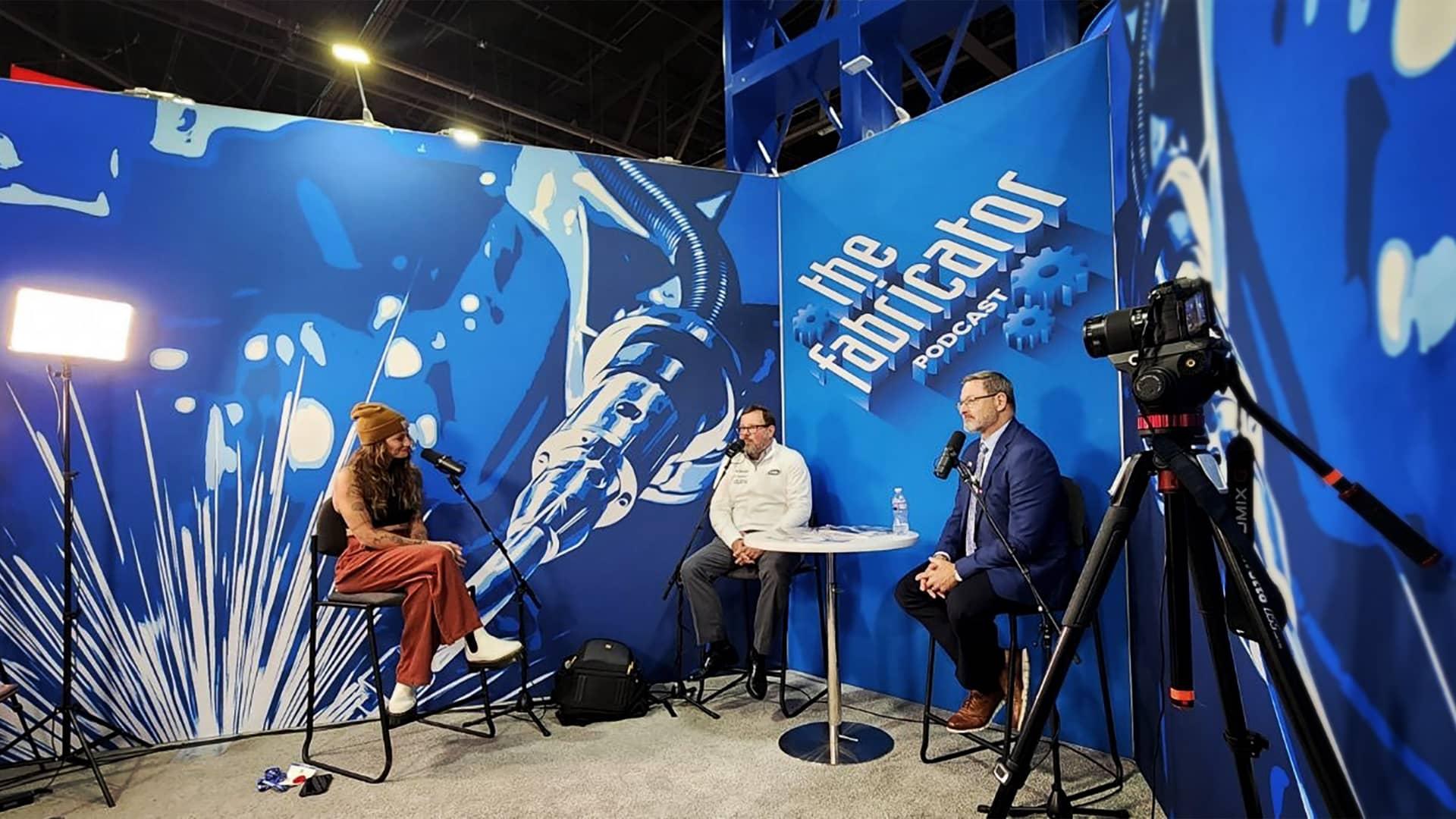
About This Podcast
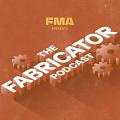
All Episodes
-
 Ep. 055
Ep. 055 -
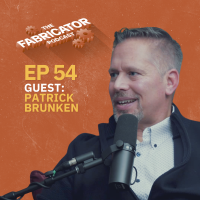 Ep. 054
Ep. 054 -
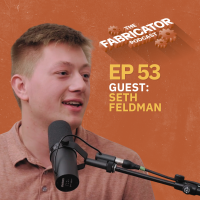 Ep. 053
Ep. 053 -
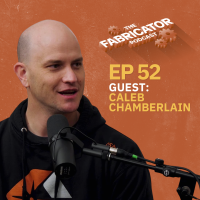 Ep. 052
Ep. 052 -
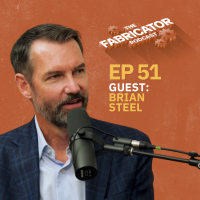 Ep. 051
Ep. 051 -
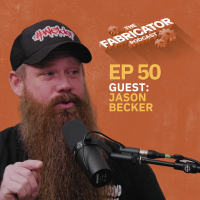 Ep. 050
Ep. 050 -
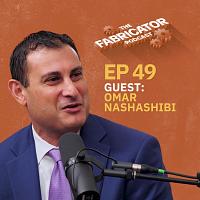 Ep. 049
Ep. 049 -
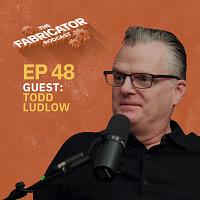 Ep. 048
Ep. 048 -
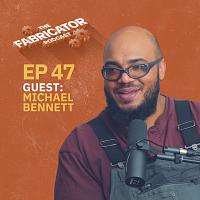 Ep. 047
Ep. 047 -
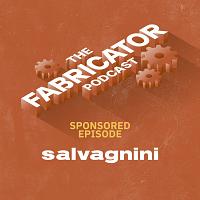 Bonus
Bonus -
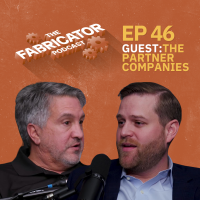 Ep. 046
Ep. 046 -
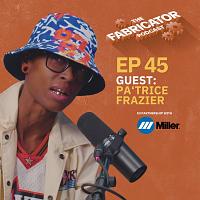 Ep. 045
Ep. 045 -
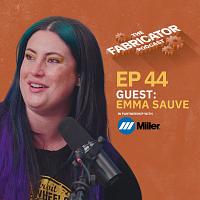 Ep. 044
Ep. 044 -
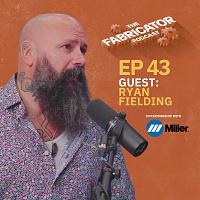 Ep. 043
Ep. 043 -
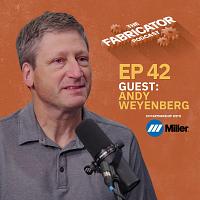 Ep. 042
Ep. 042 -
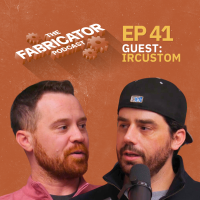 Ep. 041
Ep. 041 -
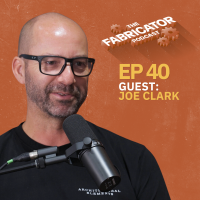 Ep. 040
Ep. 040 -
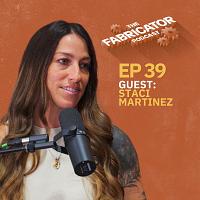 Ep. 039
Ep. 039 -
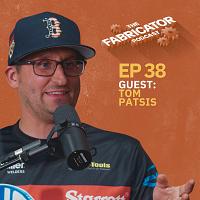 Ep. 038
Ep. 038 -
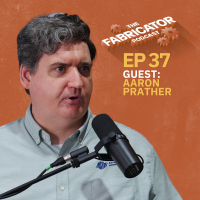 Ep. 037
Ep. 037 -
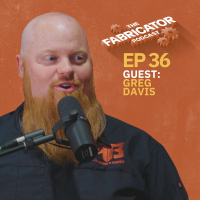 Ep. 036
Ep. 036 -
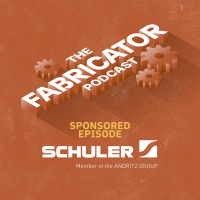 Bonus
Bonus -
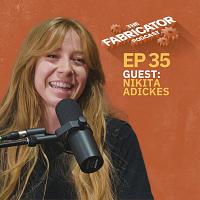 Ep. 035
Ep. 035 -
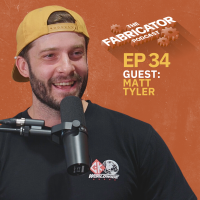 Ep. 034
Ep. 034 -
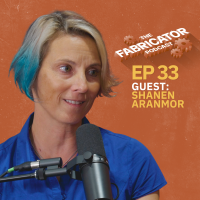 Ep. 033
Ep. 033







